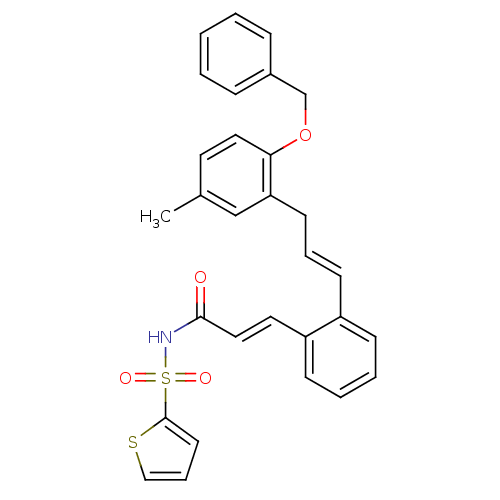 Found 4 hits for monomerid = 50193927
Found 4 hits for monomerid = 50193927 Target/Host
(Institution) | Ligand | Target/Host
Links | Ligand
Links | Trg + Lig
Links | Ki
nM | ΔG°
kcal/mole | IC50
nM | Kd
nM | EC50/IC50
nM | koff
s-1 | kon
M-1s-1 | pH | Temp
°C |
|---|
Prostaglandin E2 receptor
(Homo sapiens (Human)) | BDBM50193927

(3-(2-((E)-3-(2-(benzyloxy)-5-methylphenyl)prop-1-e...)Show SMILES Cc1ccc(OCc2ccccc2)c(C\C=C\c2ccccc2\C=C\C(=O)NS(=O)(=O)c2cccs2)c1 Show InChI InChI=1S/C30H27NO4S2/c1-23-16-18-28(35-22-24-9-3-2-4-10-24)27(21-23)14-7-13-25-11-5-6-12-26(25)17-19-29(32)31-37(33,34)30-15-8-20-36-30/h2-13,15-21H,14,22H2,1H3,(H,31,32)/b13-7+,19-17+ | PDB
KEGG
UniProtKB/SwissProt
DrugBank
antibodypedia
GoogleScholar
AffyNet 
| CHEMBL
PC cid
PC sid
UniChem
Similars
| Article
PubMed
| 10 | n/a | n/a | n/a | n/a | n/a | n/a | n/a | n/a |
Merck Frosst Centre for Therapeutic Research
Curated by ChEMBL
| Assay Description
Binding affinity to EP3 receptor |
Bioorg Med Chem Lett 16: 5639-42 (2006)
Article DOI: 10.1016/j.bmcl.2006.08.025
BindingDB Entry DOI: 10.7270/Q2NS0VQ6 |
More data for this
Ligand-Target Pair | |
Prostaglandin E2 receptor EP4 subtype
(Homo sapiens (Human)) | BDBM50193927

(3-(2-((E)-3-(2-(benzyloxy)-5-methylphenyl)prop-1-e...)Show SMILES Cc1ccc(OCc2ccccc2)c(C\C=C\c2ccccc2\C=C\C(=O)NS(=O)(=O)c2cccs2)c1 Show InChI InChI=1S/C30H27NO4S2/c1-23-16-18-28(35-22-24-9-3-2-4-10-24)27(21-23)14-7-13-25-11-5-6-12-26(25)17-19-29(32)31-37(33,34)30-15-8-20-36-30/h2-13,15-21H,14,22H2,1H3,(H,31,32)/b13-7+,19-17+ | PDB
Reactome pathway
KEGG
UniProtKB/SwissProt
DrugBank
antibodypedia
GoogleScholar
AffyNet 
| CHEMBL
PC cid
PC sid
UniChem
Similars
| Article
PubMed
| 960 | n/a | n/a | n/a | n/a | n/a | n/a | n/a | n/a |
Merck Frosst Centre for Therapeutic Research
Curated by ChEMBL
| Assay Description
Binding affinity to EP4 receptor |
Bioorg Med Chem Lett 16: 5639-42 (2006)
Article DOI: 10.1016/j.bmcl.2006.08.025
BindingDB Entry DOI: 10.7270/Q2NS0VQ6 |
More data for this
Ligand-Target Pair | |
Prostaglandin E2 receptor EP2 subtype
(Homo sapiens (Human)) | BDBM50193927

(3-(2-((E)-3-(2-(benzyloxy)-5-methylphenyl)prop-1-e...)Show SMILES Cc1ccc(OCc2ccccc2)c(C\C=C\c2ccccc2\C=C\C(=O)NS(=O)(=O)c2cccs2)c1 Show InChI InChI=1S/C30H27NO4S2/c1-23-16-18-28(35-22-24-9-3-2-4-10-24)27(21-23)14-7-13-25-11-5-6-12-26(25)17-19-29(32)31-37(33,34)30-15-8-20-36-30/h2-13,15-21H,14,22H2,1H3,(H,31,32)/b13-7+,19-17+ | PDB
Reactome pathway
KEGG
UniProtKB/SwissProt
DrugBank
antibodypedia
GoogleScholar
AffyNet 
| CHEMBL
PC cid
PC sid
UniChem
Similars
| Article
PubMed
| 2.10E+3 | n/a | n/a | n/a | n/a | n/a | n/a | n/a | n/a |
Merck Frosst Centre for Therapeutic Research
Curated by ChEMBL
| Assay Description
Binding affinity to EP2 receptor |
Bioorg Med Chem Lett 16: 5639-42 (2006)
Article DOI: 10.1016/j.bmcl.2006.08.025
BindingDB Entry DOI: 10.7270/Q2NS0VQ6 |
More data for this
Ligand-Target Pair | |
Prostaglandin E2 receptor EP1 subtype (EP1)
(Homo sapiens (Human)) | BDBM50193927

(3-(2-((E)-3-(2-(benzyloxy)-5-methylphenyl)prop-1-e...)Show SMILES Cc1ccc(OCc2ccccc2)c(C\C=C\c2ccccc2\C=C\C(=O)NS(=O)(=O)c2cccs2)c1 Show InChI InChI=1S/C30H27NO4S2/c1-23-16-18-28(35-22-24-9-3-2-4-10-24)27(21-23)14-7-13-25-11-5-6-12-26(25)17-19-29(32)31-37(33,34)30-15-8-20-36-30/h2-13,15-21H,14,22H2,1H3,(H,31,32)/b13-7+,19-17+ | KEGG
UniProtKB/SwissProt
DrugBank
antibodypedia
GoogleScholar
AffyNet 
| CHEMBL
PC cid
PC sid
UniChem
Similars
| Article
PubMed
| 2.30E+3 | n/a | n/a | n/a | n/a | n/a | n/a | n/a | n/a |
Merck Frosst Centre for Therapeutic Research
Curated by ChEMBL
| Assay Description
Binding affinity to EP1 receptor |
Bioorg Med Chem Lett 16: 5639-42 (2006)
Article DOI: 10.1016/j.bmcl.2006.08.025
BindingDB Entry DOI: 10.7270/Q2NS0VQ6 |
More data for this
Ligand-Target Pair | |


 Search and Browse
Search and Browse
 Download
Download
 Enter Data
Enter Data